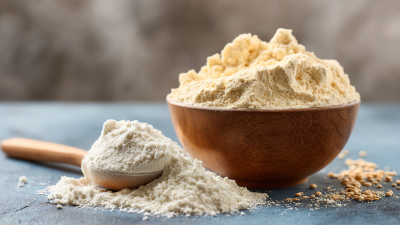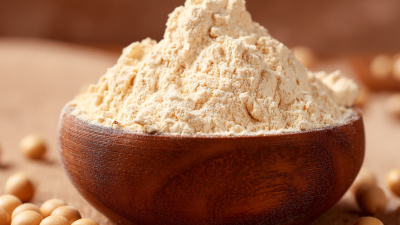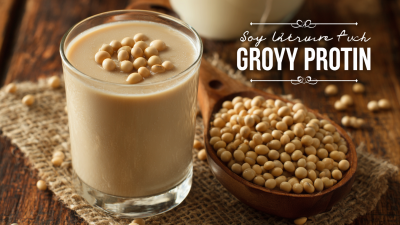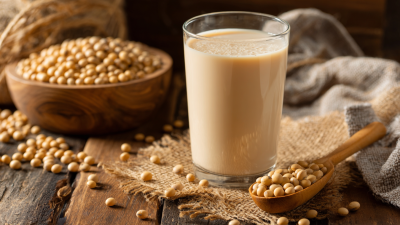In recent years, the fitness community has increasingly recognized the benefits of incorporating plant-based proteins into diets, especially for muscle growth and recovery. Among these alternatives, Soy Protein stands out due to its comprehensive amino acid profile, making it a top choice for athletes and fitness enthusiasts alike. Not only does Soy Protein provide a powerful boost in protein intake without the saturated fats often found in animal products, but it also offers additional health benefits, including cholesterol management and improved heart health. As more individuals seek sustainable and environmentally friendly dietary options, the demand for effective Soy Protein products continues to rise.

In this blog, we will explore the 7 best Soy Protein products for muscle growth in 2023, delving into their unique features, nutritional profiles, and how they can fit into a diverse fitness regimen. Whether you're a seasoned bodybuilder or a casual gym-goer, this guide will help you discover the best Soy Protein options to enhance your performance and reach your fitness goals.
Soy protein has emerged as a prominent choice for those looking to enhance muscle growth, supported by a body of scientific research that highlights its benefits. A study published in the Journal of Nutrition found that soy protein can effectively stimulate muscle protein synthesis, comparable to that of whey protein. This is attributed to its rich amino acid profile, particularly high levels of essential amino acids like leucine, which plays a critical role in muscle repair and growth. In fact, a meta-analysis by the American Journal of Clinical Nutrition indicated that individuals consuming soy protein experienced similar gains in strength and muscle mass as those consuming animal protein sources.
Moreover, the versatility of soy protein makes it an attractive option for both athletes and fitness enthusiasts. According to a report by the Soy Protein Association, soy protein not only supports muscle growth but also contributes to improved recovery times and reduced muscle soreness post-exercise. Additionally, soy protein is plant-based, making it suitable for various dietary preferences, including vegetarian and vegan diets. This aspect becomes increasingly important as more people seek sustainable protein sources. With its robust nutritional profile and positive effects on muscle development, soy protein remains a valuable ally for anyone aiming to enhance their fitness journey in 2023.
| Product Name | Protein Content (g per serving) | Calories (per serving) | Flavor Options | Key Benefits |
|---|---|---|---|---|
| Soy Protein Isolate | 25 | 120 | Vanilla, Chocolate, Unflavored | Rich in amino acids, low in fat |
| Soy Protein Concentrate | 20 | 110 | Chocolate, Strawberry | Supports muscle recovery, heart health |
| Textured Soy Protein | 30 | 140 | Original, Spicy | Great for meat alternatives, high fiber |
| Soy Protein Smoothie Mix | 15 | 100 | Berry Blend, Tropical | Convenient on-the-go protein source |
| Soy Protein Bars | 20 | 200 | Peanut Butter, Oatmeal Raisin | Snack for muscle gain, easy to carry |
| Soy Protein Pancake Mix | 12 | 150 | Maple, Chocolate Chip | High in protein, tasty breakfast |
| Soy Protein Muffin Mix | 10 | 120 | Banana Nut, Blueberry | Healthy snack, low sugar |
When considering the best source of protein for muscle growth, it’s essential to compare soy protein isolate and concentrate.
 Soy protein isolate is a highly refined form that contains around 90% protein and minimal fats or carbohydrates, making it an excellent choice for those seeking to maximize their protein intake without excess calories. This purity also enhances its digestibility and absorption, making it particularly beneficial for athletes and those engaged in strength training.
Soy protein isolate is a highly refined form that contains around 90% protein and minimal fats or carbohydrates, making it an excellent choice for those seeking to maximize their protein intake without excess calories. This purity also enhances its digestibility and absorption, making it particularly beneficial for athletes and those engaged in strength training.
On the other hand, soy protein concentrate contains about 70% protein, retaining more nutrients and bioactive compounds compared to its isolate counterpart. This form can support overall health through its higher fiber content and is often preferable for those looking to enrich their diet rather than just boost protein intake. In recent years, the technology behind protein extraction has advanced, resulting in varied products with improved functional properties for use in diverse applications. Ultimately, the choice between isolate and concentrate may depend on individual dietary goals, personal preferences, and the specific benefits one seeks from a plant-based protein source.
The role of amino acids in soy protein is critical for muscle recovery and growth, making it a popular choice for athletes and fitness enthusiasts. Soy protein is unique because it contains a well-balanced profile of amino acids, including essential ones that are crucial for muscle repair after intense workouts. Research indicates that consuming adequate amounts of high-quality protein, like soy, can enhance muscle protein synthesis and facilitate quicker recovery, allowing athletes to train harder and more frequently.
Recent studies have shown that when plant-based protein blends are properly formulated and consumed in higher doses, they can be just as effective as traditional whey protein in supporting muscle recovery. This is significant for those who are looking to optimize their diet without animal products. The incorporation of soy and other plant proteins into meals can meet the protein demands of athletes, aiding not only in muscle recovery but also in overall physical performance. As athletes increasingly turn to plant-based nutrition, understanding the impacts of amino acids in these proteins becomes essential for maximizing their training outcomes.
The fitness industry has witnessed a remarkable shift towards plant-based proteins, driven by increasing consumer awareness and demand for healthy, sustainable options. According to a recent report by Grand View Research, the plant-based protein market is projected to reach approximately $32 billion by 2027, growing at a compound annual growth rate (CAGR) of 9.5%. This trend is largely attributed to a growing number of athletes and fitness enthusiasts seeking alternatives to traditional animal-based proteins, particularly due to concerns about health and environmental impact.
Soy protein, in particular, has emerged as a leading player in this market. Research indicates that soy protein not only supports muscle growth but also offers a complete amino acid profile, making it an excellent choice for those engaging in strength training. Furthermore, a study published in the Journal of Agricultural and Food Chemistry found that soy protein supplementation can enhance muscle strength and recovery in athletes. As more consumers embrace plant-based diets, the demand for quality soy protein products is expected to surge, reflecting broader trends in health consciousness and sustainability within the fitness sector.
When it comes to muscle growth, soy protein products have gained significant popularity due to their high nutritional value and plant-based benefits. In 2023, a multitude of options are available, but the best products stand out not just for their ingredients but also for their customer satisfaction. Our top picks are rated highly based on both nutritional content and user reviews, ensuring you choose a product that truly supports your fitness journey.
Among the top-rated soy protein products, you'll find brands that prioritize clean ingredients and optimal protein content. For instance, several products are recognized for having a balanced amino acid profile and low in additives, making them perfect for muscle recovery and growth. Customer reviews often highlight taste and mixability, factors that can significantly impact your overall experience. Whether you're a serious athlete or a casual gym-goer, selecting a soy protein that resonates well with both nutritional goals and positive consumer feedback can enhance your performance and support your health.







